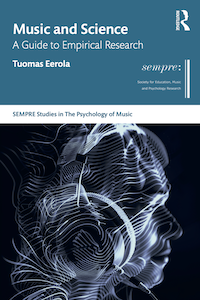Music and Science book now out

I’m thrilled to announce the release of my new textbook in the fields of music and science and music psychology. My book, titled Music and Science: A Guide to Empirical Research, accumulates a decade of experience of teaching these subjects at Durham University. Over the past five years, both undergraduate and postgraduate students have accessed earlier drafts, and their invaluable feedback has shaped the book’s content and tone.
The book explores empirical research in music and music psychology, as well as computational approaches to music research. These disciplines share strong synergies, overlapping interests, and similar methodologies. The chapters guide readers through historical foundations, key concepts, empirical methods, research design, data sources, and analysis techniques. Dedicated chapters focus on computational methods, including audio analysis, event-based and symbolic approaches, and corpus studies. A standout feature of the book is its emphasis on diversity. I’ve intentionally included a broad range of references, highlighting contributions from female scholars and researchers from outside the Anglo-American sphere. The music examples are equally diverse, drawing on Indian music, protest music, popular genres, and folk traditions.
Promoting Open Research
One of the objectives of my book is to emphasize Open Research practices, with extensive discussions on transparency, preregistration, replication, data sharing, open-access publishing, and preprints. Concrete examples illustrate these principles, many drawn from recent studies conducted at the Music and Science Lab, where we’ve actively embraced these initiatives. While it wasn’t feasible to release the book as an open-access monograph, I hope the softcover version remains affordable, offering 298 pages of insights and guidance, sold by Routledge and Taylor & Francis (see their page for previews, contents, and reviews).
To support readers further, I’ve created an electronic repository on GitHub, housing the computer code used in the book. This Quarto-powered repository includes R and Python scripts for relevant chapters, along with links to interactive notebooks in Google Colab. These resources enable readers to replicate the analyses and visualizations in the book and encourage the adoption of transparent practices in their own research.
Acknowledgments
Lastly, I’d like to extend heartfelt thanks to the many students and colleagues who contributed to this project. The work done by the alumni from our Music and Science Lab, including Scott Bannister, Lennie Thomas, and Annaliese Micallef Grimaud, whose fascinating research is features in the examples. The closest colleague at Durham, Kelly Jakubowski, has also supported the project along the way. Juan Sebastián Gomez-Cañón provided inspiration and technical suggestions that encouraged me to take all code to GitHub as Jupyter notebooks. A very special thanks goes to the following colleagues – Mats Küssner, Laura Leante, Fabian Moss, Imre Lahdelma, and Brian McFee — for their detailed feedback on the initial drafts. SEMPRE made the release possible through their book series Sempre Studies in the Psychology of Music.
I hope you enjoy the book and find it inspirational.
Tuomas
P.S. The cover image was created by me with the help of Midjourney
